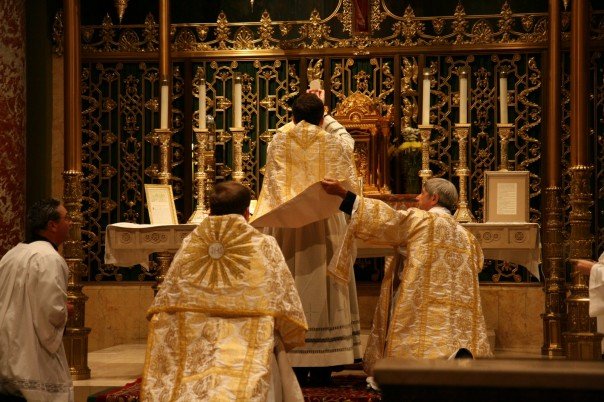THE TREMENDOUS VALUE OF HOLY MASS
In the Mass, under the appearance of bread and wine, Jesus Christ is present, whole and entire, living, real, and substantial, as He was born in the stable of Bethlehem, as He died on the Cross, as He reigns in Paradise; in Body and Blood, Soul and Divinity. This was defined by the Council of Trent as taught by Sacred Scriptures. In every Mass Jesus is sacrificed anew on the altar at the hands of the priest, without the actual shedding of blood. Yes, he really sacrifices Himself for us in order to render to God for us the honour due to Him, in order to procure for us by means of our contrition forgiveness of our sins, in order to pay with our co-operation the debts we have contracted with God, in order to obtain for us all graces and blessings; in a word, He sacrifices Himself that He may apply to each one of us the fruits of His Passion and Death. - Taken from 'The Greatest Treasure' by Rev. Joseph L. Chiavarino

At the hour of death the Masses you have heard will be your greatest consolation.
Every Mass will go with you to judgement and plead for your pardon.
At every Mass you can diminish the temporal punishment due to your sins, more or less, according to your fervour.
Assisting devoutly at Mass you render to the Sacred Humanity of Our Lord the greatest homage.
He supplies for many of your negligences and omissions.
He forgives you all the venial sins which you have never confessed.
The power of Satan over you is diminished.
You afford the souls in purgatory the greatest possible relief.
One Mass heard during your life will be of more benefit to you than many heard for you after your death.
You are preserved from many dangers and misfortunes which would otherwise have befallen you.
You shorten your purgatory by every Mass.
Every Mass wins for you a higher degree of glory in Heaven.
You receive the priest's blessing, which Our Lord ratifies in Heaven.
You kneel amidst a multitude of holy angels, who are present at the adorable sacrifice with reverential awe.
You are blessed in your temporal goods and affairs.
Every time we assist at Mass we should, beside our other intentions, offer it in honour of the saint of the day.
When we hear Mass and offer the Holy Sacrifice in honour of any particular saint or angel, thanking God for favours He bestowed on him, we afford him a great degree of honour, joy, and happiness, and draw his special love and protection on us.
- Catholic Quote, Valparaiso, Ne. 68065